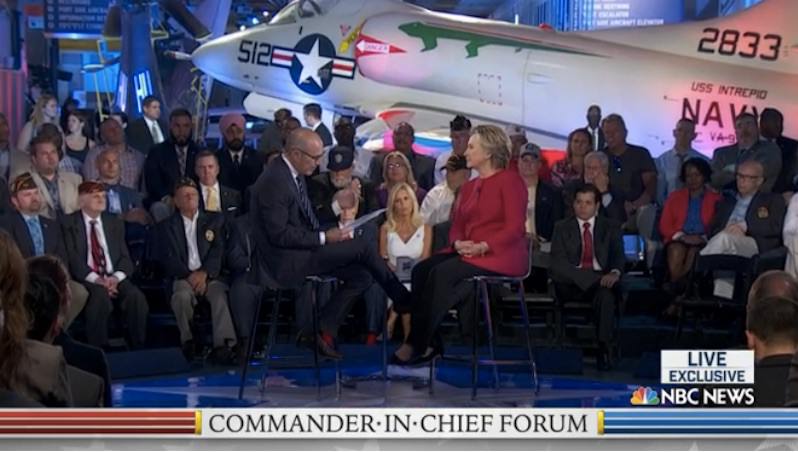Commander-in-Chief Forum Panned as Colossal Failure of Journalism
NBC hosted a presidential spectacle aboard a retired aircraft carrier on Wednesday night. It did not go well. NBC News
NBC News
By Jon Queally / Common Dreams
Putting aside the shortcomings of both major candidates, for many critical observers the biggest loser during Wednesday night’s presidential “Commander-in-Chief” forum on NBC News was the platform itself.
Moderated by NBC’s host of The Today Show Matt Lauer, the town hall-style event was staged inside the belly of the U.S.S. Intrepid, a retired World War II aircraft carrier that now serves as a military museum in New York City, and was promoted by the news outlet as a chance to extract specific positions from both Hillary Clinton and Donald Trump on veterans affairs and foreign policy.
But instead of informing viewers on these key subject matters or holding the candidates to account for past actions or statements, a widespread reaction among progressive viewers and critical journalists from across the political spectrum was that Lauer failed to ask the necessary tough questions or followups, with many suggesting the forum was a lesson in how not to inform voters or put a check on those seeking high office.
According to Michael Calderone, senior media reporter for the Huffington Post, the forum “should have gone down as the first time the two 2016 presidential candidate shared a stage,” but instead “will be remembered largely for the shortcomings of the man who was tasked with moderating.”
Writing for The Intercept, staff journalists Zaid Jilani and Alex Emmons described the NBC production and Lauer’s performance as a “master class on how not to hold candidates accountable” before a national audience.
“From the questions chosen to the format,” Jilani and Emmons said that despite some good questions from veterans in the audience the event—which ran only one hour during prime time—was a total failure:
In the 25 minutes devoted to Clinton, nearly half was spent by Lauer grilling her about her use of a private e-mail server while Secretary of State (one veteran also asked about the issue). That left little room for questions on policies she presided over while in office.
Lauer repeatedly failed to fact-check candidates on their responses to questions. When Hillary Clinton explained her anti-ISIS plan by saying “we are not going to have ground troops in Iraq,” he failed to point out that we already do have those troops. When Donald Trump claimed to have opposed the wars in Iraq and Libya from the beginning, Lauer failed to correct him and tell the audience that wasn’t true.
Adam Green, co-founder of the Progressive Change Campaign Committee, called the forum “an absolute disgrace” and just more proof that the entire presidential debate system needs an overhaul. “Matt Lauer treated this forum less as a chance to educate voters about the real differences in temperament and policy between the candidates and more as a chance to do clickbait trolling,” Green said. “Instead of asking about big ideas, he asked small-bore questions that voters aren’t asking at their dinner tables.”
Columnist Jonathan Chait, meanwhile, dubbed Lauer’s interview approach as “pathetic” and lamented the impact such performances have on the voting public and, ultimately, the election.
“I had not taken seriously the possibility that Donald Trump could win the presidency until I saw Matt Lauer host an hour-long interview with the two major party candidates,” wrote Chait following the event. “Lauer’s performance was not merely a failure, it was horrifying and shocking. The shock, for me, was the realization that most Americans inhabit a very different news environment than professional journalists. I not only consume a lot of news, since it’s my job, I also tend to focus on elite print news sources. Most voters, and all the more so undecided voters, subsist on a news diet supplied by the likes of Matt Lauer. And the reality transmitted to them from Lauer matches the reality of the polls, which is a world in which Clinton and Trump are equivalently flawed.”
Offering at least some buffer to the individual criticism, HuffPo’s Calderone acknowledged that part of Lauer’s failures on Wednesday night “were not of his own making,” but could be attributed to the format of the event. “With only a half-hour with each candidate, he was pressed for time and forced to rush through topics while bringing in audience questions and timely follow-ups,” Calderone wrote.
For many on social media, however, Lauer would not be let off the hook so easily:
@cascamike @BernItUpTV @MLauer and who would you suggest? They’re all part of the same for-profit media.
— #NoDAPL (c) (@burnodo) September 8, 2016
matt lauer is who we thought he was.
— mike casca (@cascamike) September 8, 2016
Nice thing about Lauer botching this debate so badly is we have a poster child for “Failed Journalism 2016.”
— emptywheel (@emptywheel) September 8, 2016
Is it possible that after the #CommanderInChiefForum we know less about where Trump and Clinton stand than we did before?
— John Nichols (@NicholsUprising) September 8, 2016
Wow. That was scary. #NBCNewsForum
— ruth conniff (@rconniff) September 8, 2016
Though Wednesday night’s event was a one-on-one format, the first presidential debate with both candidates on stage together facing questions, is scheduled for Sept. 26 and will be moderated NBC News anchor Lester Holt.
Your support matters…Independent journalism is under threat and overshadowed by heavily funded mainstream media.
You can help level the playing field. Become a member.
Your tax-deductible contribution keeps us digging beneath the headlines to give you thought-provoking, investigative reporting and analysis that unearths what's really happening- without compromise.
Give today to support our courageous, independent journalists.






You need to be a supporter to comment.
There are currently no responses to this article.
Be the first to respond.